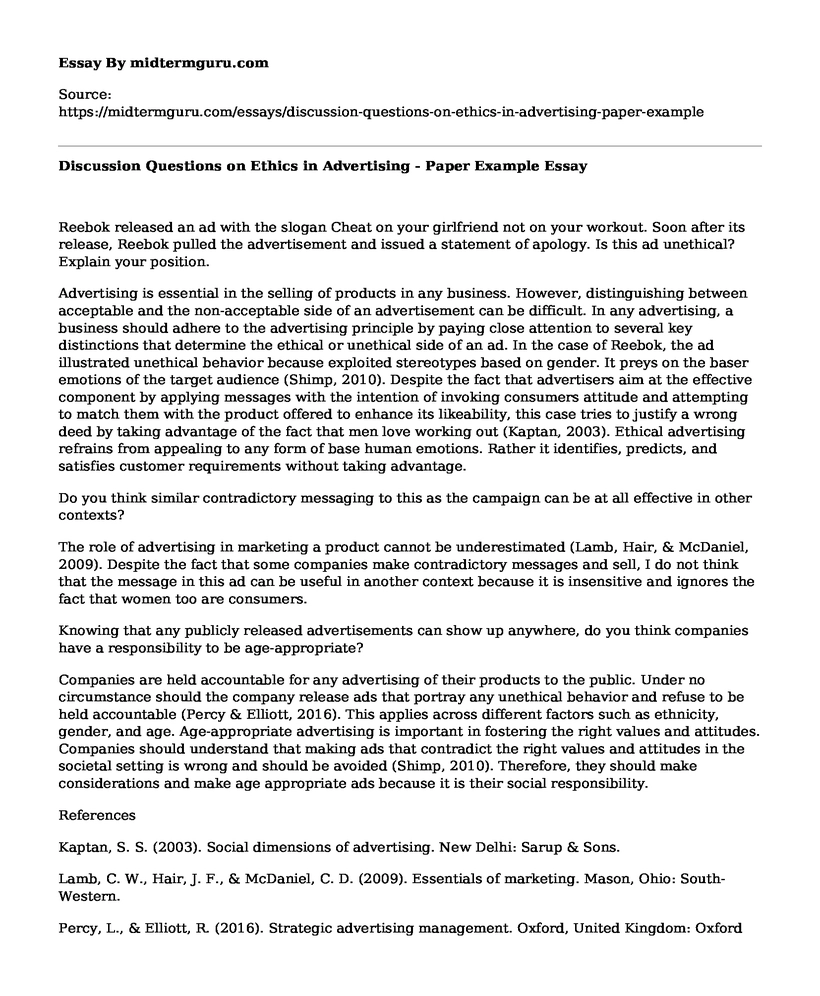Reebok released an ad with the slogan Cheat on your girlfriend not on your workout. Soon after its release, Reebok pulled the advertisement and issued a statement of apology. Is this ad unethical? Explain your position.
Advertising is essential in the selling of products in any business. However, distinguishing between acceptable and the non-acceptable side of an advertisement can be difficult. In any advertising, a business should adhere to the advertising principle by paying close attention to several key distinctions that determine the ethical or unethical side of an ad. In the case of Reebok, the ad illustrated unethical behavior because exploited stereotypes based on gender. It preys on the baser emotions of the target audience (Shimp, 2010). Despite the fact that advertisers aim at the effective component by applying messages with the intention of invoking consumers attitude and attempting to match them with the product offered to enhance its likeability, this case tries to justify a wrong deed by taking advantage of the fact that men love working out (Kaptan, 2003). Ethical advertising refrains from appealing to any form of base human emotions. Rather it identifies, predicts, and satisfies customer requirements without taking advantage.
Do you think similar contradictory messaging to this as the campaign can be at all effective in other contexts?
The role of advertising in marketing a product cannot be underestimated (Lamb, Hair, & McDaniel, 2009). Despite the fact that some companies make contradictory messages and sell, I do not think that the message in this ad can be useful in another context because it is insensitive and ignores the fact that women too are consumers.
Knowing that any publicly released advertisements can show up anywhere, do you think companies have a responsibility to be age-appropriate?
Companies are held accountable for any advertising of their products to the public. Under no circumstance should the company release ads that portray any unethical behavior and refuse to be held accountable (Percy & Elliott, 2016). This applies across different factors such as ethnicity, gender, and age. Age-appropriate advertising is important in fostering the right values and attitudes. Companies should understand that making ads that contradict the right values and attitudes in the societal setting is wrong and should be avoided (Shimp, 2010). Therefore, they should make considerations and make age appropriate ads because it is their social responsibility.
References
Kaptan, S. S. (2003). Social dimensions of advertising. New Delhi: Sarup & Sons.
Lamb, C. W., Hair, J. F., & McDaniel, C. D. (2009). Essentials of marketing. Mason, Ohio: South-Western.
Percy, L., & Elliott, R. (2016). Strategic advertising management. Oxford, United Kingdom: Oxford University Press.
Shimp, T. A. (2010). Advertising, promotion, and other aspects of integrated marketing communications. Mason, Ohio: South-Western Cengage Learning.
Cite this page
Discussion Questions on Ethics in Advertising - Paper Example. (2021, Jun 18). Retrieved from https://midtermguru.com/essays/discussion-questions-on-ethics-in-advertising-paper-example
If you are the original author of this essay and no longer wish to have it published on the midtermguru.com website, please click below to request its removal:
- Paper Example on How Approaches Affect Online Consumer Behavior
- QUICs Methods of Getting Customers
- Essay on Political Advertising: It's Morning in America Again
- Essay on Understanding Quality and Performance of Healthcare Services
- Research Paper on Effects Of 3D Printing Technology on Logistics Within the Supply Chain
- Paper Example on Supply Chain Management
- Benefit From the Adoption of Sustainable Environmentally Focused Green Strategy in the US Market







